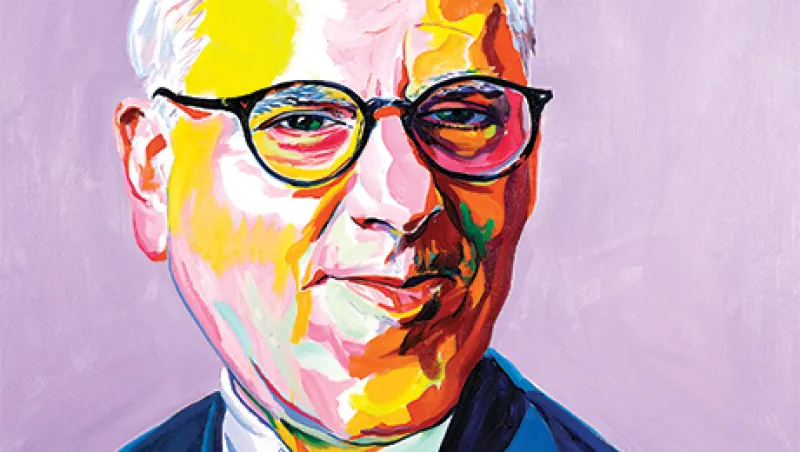It would have been a mistake to assume I understood David Rubenstein’s approach to money from playing Monopoly with him. He built houses on every property he owned, regardless of the neighborhood. “I buy everything,” Rubenstein, co-founder and co-CEO of private equity firm Carlyle Group, told me.
We were seated in an airy loft in Manhattan’s Chelsea neighborhood, shooting an interview as part of Institutional Investor’s “War Stories over Board Games” video series, in which financial titans recount the most memorable moments of their careers over a board or card game. Rubenstein may have seemed like he’d be a natural at the famous property-trading game, but he failed to double-check how much money I doled out at the beginning of the game, and he never asked to get paid after passing Go.
Such indifference hardly would have powered Carlyle, which Rubenstein, 67, co-founded in 1987, to amass $158 billion in private equity, real estate, infrastructure, energy and credit investments. But observing Rubenstein’s gaming strategy did provide a few hints as to what’s behind his success. When I told him that as a kid I always questioned whether I should build houses on the cheap properties rather than Boardwalk, he quickly answered that I should buy something cheap and let it appreciate. He offered another lesson when he pulled a card from Community Chest and was dunned $40 for street repairs. “I don’t think that’s fair,” he said, adding that he would go straight to the tax assessor. “Always hire a good lawyer,” he quipped. Rubenstein was once one himself. After graduating from the University of Chicago Law School in 1973, he practiced law privately for two years before joining the government as chief counsel to the Senate Judiciary Committee’s subcommittee on constitutional amendments. By 1977 he had worked his way up to the job of deputy assistant to president Jimmy Carter, but that stint ended when Ronald Reagan took office in 1981.
Rubenstein then joined a big law firm, but his heart and mind were elsewhere. Inspired by William Simon’s 1981 leveraged buyout of Gibson Greetings, which turned $1 million into $80 million in two and a half years, Rubenstein began thinking about how to start a different kind of private equity firm. He thought a Washington-based firm that invested in companies influenced by the federal government could be a good bet, particularly if it attracted people who knew how the state worked. His preoccupation with this idea was a sign, in his mind, that he wasn’t cut out for the law. “If you’re good at what you do, you don’t have time to think about something else,” he says.
In 1987, Rubenstein, Daniel D’Aniello, and William Conway Jr. co-founded Carlyle with $5 million. Over the years a slew of political luminaries have served as advisers to the firm, including former president George H.W. Bush, onetime secretary of Defense Frank Carlucci, and ex–secretary of State James Baker III.
Not being a finance guy, Rubenstein knew that he needed to make himself indispensable in a different way. But he wasn’t graced with effortless glad-handing capabilities, either. “Fundraisers were more outgoing,” he explains. “But I had persistence.” It paid off: He once approached a potential investor in Geneva ten times before the man finally said yes.
Even now the fast-talking Rubenstein maintains a grueling schedule. He tells me that in March he attended a morning conference in Berlin, had lunch in Helsinki and dinner in New York, and was back in D.C. for an evening reception.
These days he is applying some of that relentless energy to avoid being the “richest person in the cemetery,” as he describes it. Rubenstein was the first private equity executive to sign the Giving Pledge, committing to donate at least half of his wealth to charity. He’s now personally involved in 33 nonprofit organizations: sitting on their boards, advising them, helping them raise funds, and giving speeches on their behalf. Part of his giving is earmarked for “patriotic philanthropy,” a term he coined to describe his passion for American history and helping the country care for its monuments and aging treasures. Among many other projects, Rubenstein is supporting Thomas Jefferson’s home, Monticello, and George Washington’s Mount Vernon, and he has purchased rare copies of historical documents, including the 13th Amendment, the Emancipation Proclamation, and the Magna Carta, which inspired the founding fathers.
“The theory I have is that if we’re more informed citizens, we’ll have a better democracy, ” he says. Though many of these documents can be viewed online, Rubenstein is convinced that when people visit a museum and see the original, it’s a more inspiring and lasting experience.
Even though every month Rubenstein gets requests for about $50 million for charitable work he describes as serious, he personally chooses what he wants to support, and he gets involved. In 2011 he committed to foot the bill to restore the earthquake-damaged Washington Monument. When the obelisk was sheathed in scaffolding, Rubenstein was asked if he wanted to visit the top. Then–Interior secretary Sally Jewell told him she had climbed Mount Rainier seven times and would be humiliated to take the elevator. Rubenstein joked, “I’ve flown over Mount Rainier seven times,” but nonetheless he climbed the stairs. After reaching the top and being clipped into a safety harness, he secretly scrawled his initials below the peak. He tells me I should go to the top and check if his initials are still there.
Rubenstein maintains his ties to the D.C. establishment. For two years he’s been inviting members of Congress to events on behalf of the Library of Congress featuring historians such as David McCullough, author of a biography on John Adams, and Jay Winik, who wrote 1944: FDR and the Year That Changed History. Rubenstein interviews the guest historian after a dinner that includes Democratic and Republican members of Congress. “That’s rare in Washington,” he notes.
The consummate Washington insider has his own opinions on government policy. Rubenstein has drawn criticism for his advocacy of the carried interest tax loophole, defending it as the reason for his industry’s growth. Originally intended to reward the risks of building businesses from scratch, the loophole allows private equity firms to pay capital gains taxes — rather than income taxes, which are higher — on their share of profits from their investments. The arcane tax has become a high-profile symbol of income inequality for both Republicans and Democrats.
As our interview draws to a close, it’s time to settle up. Rubenstein owes me $30 in rent, and I also get $45 from the sale of stock. Rubenstein wants to reinvent the game and call it Monopoly and Philanthropy: Instead of the winner being the one with the most money, it should be the one whose money does the most good. “If you really want to be remembered for 1,000, 2,000 years, you should build a pyramid,” he says. “But that’s not a great value to society.”







